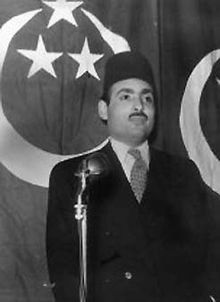Ahmed Hussein (1911–1982)
Ahmed Hussein | |
|---|---|
 Hussein during the inauguration of Young Egypt in 1933 | |
| Born | Ahmed Mahmoud Hussein 8 March 1911 |
| Died | 27 September 1982 (aged 71) |
| Occupation | Lawyer |
| Years active | 1929–1969 |
| Known for | Founder of Young Egypt Party |
| Relatives | Adel Hussein (brother) |
Ahmed Hussein (8 March 1911–27 September 1982) was an Egyptian lawyer and politician who founded a nationalist party, Young Egypt, in the 1930s.
Early life and education[edit]
Hussein was born on 8 March 1911.[1] His father, Mahmoud Hussein, was a civil servant at the Ministry of Finance. The family was from Kafr El Battikh near Damietta and had lands in Lower Egypt.[1]
Hussein received religious education and a degree in law.[2][3]
Career and political activities[edit]

Hussein started a magazine entitled Al Sarkha (Arabic: Scream) in which he published a program of his political group, "Society of the Free Youth, Supporters of the Treaty", endorsing Prime Minister Mohamed Mahmoud's negotiations with the British.[1][3][4] The group included the nationalist Egyptian figures led by Hussein's friend Fathi Radwan.[5] The society's slogan was "God, Fatherland and the King", and aimed at reviving the Egyptian nationalism, especially after Egypt experienced negative outcomes of the economic crisis in 1929.[1] In late 1931, a committee of students headed by Ahmad Hussein initiated the Piastre Plan to raise funds to improve the industry in the country.[1] They managed to collect the funds and employed them to set up a fez factory.[1] In his writings in Al-Sarkha Hussein harshly criticized Western democracy and praised Fascism and Nazism supporting the implementation of these ideologies in addition to Sharia rule in Egypt.[3]
The Society of the Free Youth, Supporters of the Treaty was reestablished as a political party, Young Egypt, on 21 October 1933.[4][5] The party was modeled on the Italian National Fascist Party.[6] Hussein sent a letter to Adolf Hitler and asked him to convert to Islam.[3] Hussein was arrested in July 1941 due to his extreme nationalist activities.[2] He escaped while he was being treated at a hospital, but in November 1942 he surrendered himself to the police.[2] In 1944 he was released from prison.[2] In July 1946 Hussein was again arrested with other Young Egypt party members following the headline of the party newspaper, Al-Ishtrakia, as "Revolt, Revolt, Revolt!"[7] They were freed on bail soon.[2]
Hussein renamed his party as the Egyptian Social Democratic Party in the late 1940s, and later it was renamed as the National Islamic Party.[2] In the 1950s his brother and a member of the Young Egypt party, Adel Hussein, joined a communist party, namely Haditu.[8]
Later life and death[edit]
Hussein had a stroke in 1969 and retired from public life.[9] He died at age 71 on 27 September 1982 after he had been hospitalized because of heart problems.[9]
References[edit]
- ^ a b c d e f James P. Jankowski (1975). Egypt's young rebels: "Young Egypt": 1933–1952. Stanford, CA: Hoover Institution Press. pp. 9, 11–13. ISBN 978-0-8179-1451-6.
- ^ a b c d e f "British Documents" (PDF). Nasser Library. 3 February 1950. p. 25. Retrieved 24 July 2022.
- ^ a b c d Cynthia Farahat (Summer 2011). "The Arab Upheaval: Egypt's Islamist Shadow". Middle East Quarterly. 18 (3).
- ^ a b Fouad Fahmy Shafik (1981). The Press and Politics of Modern Egypt: 1798-1970. A Comparative Analysis of Causal Relationships (PhD thesis). New York University. p. 187. ISBN 9798661819062. ProQuest 303021068.
- ^ a b Josep Puig Montana (2013). "Oppositional movements in Egypt, from 1952 to Mubarak's downfall". Nómadas. Revista Crítica de Ciencias Sociales y Jurídicas. 39 (3): 39. doi:10.5209/rev_NOMA.2013.v39.n3.48329.
- ^ Patricia Peghini Ryan (1972). The Arab Socialist Union of Egypt (PhD thesis). West Virginia University. p. 17. ISBN 9798659245712. ProQuest 302593067.
- ^ Henry C. Atyeo (November 1952). "Egyptian Nationalism". Current History. 23 (135): 314. JSTOR 45308290.
- ^ Tareq Y. Ismael; Rifaat El Said (1990). The Communist Movement in Egypt, 1920-1988. Syracuse, NY: Syracuse University Press. p. 75. ISBN 978-0-8156-2497-4.
- ^ a b "Ahmed Hussein". The New York Times. 27 September 1982. p. 9. Retrieved 24 July 2022.
External links[edit]
 Media related to Ahmed Hussein (Egypt) at Wikimedia Commons
Media related to Ahmed Hussein (Egypt) at Wikimedia Commons
